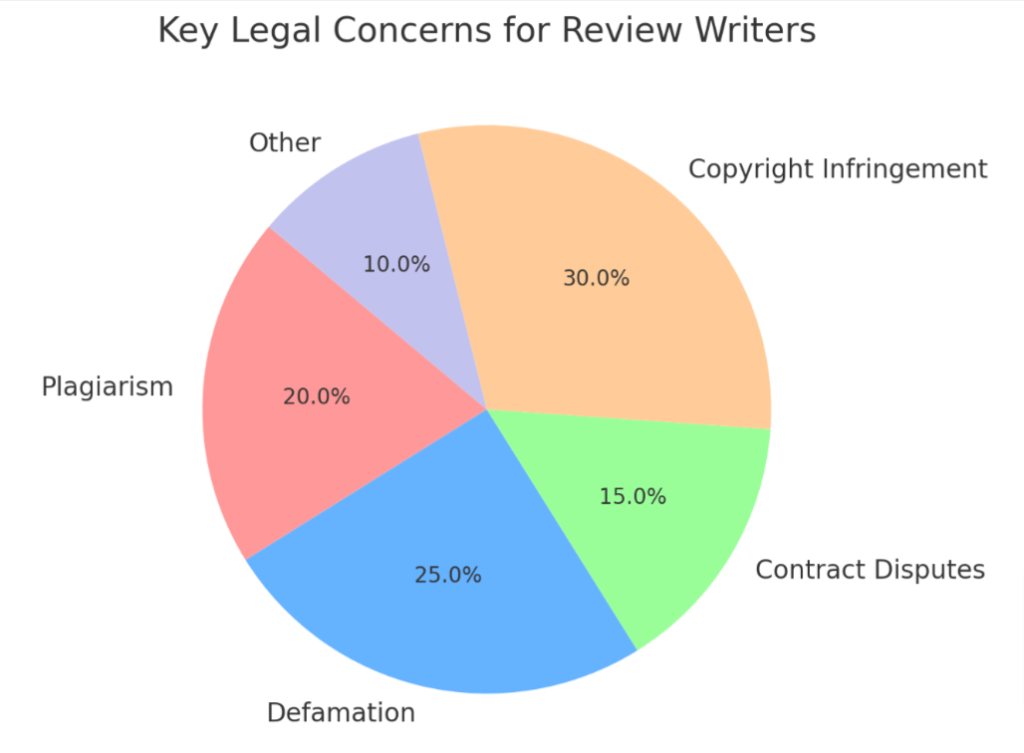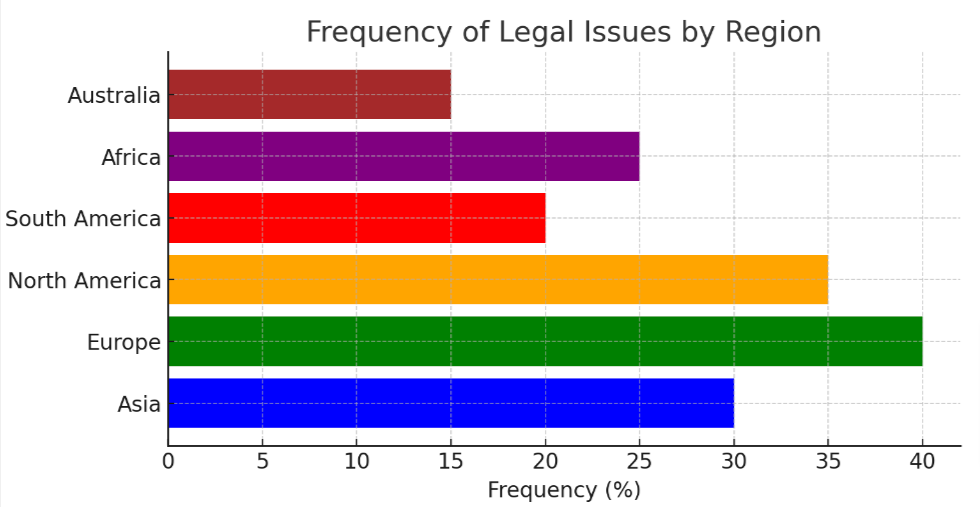Navigating International Laws in Review Writing
International review writers face tricky legal issues that can trip them up. Every day, laws change and vary across borders, affecting how reviews are written and shared. This article guides you around those legal pitfalls, ensuring your writing remains on solid ground.
Stay safe—read on!
Key Takeaways
- International review writers must understand and respect copyright laws that vary by country to avoid legal issues such as plagiarism or copyright infringement.
- It’s important for writers to create clear contracts that outline their rights and responsibilities, ensuring they are fairly compensated and their work is protected.
- Maintaining ethical standards in writing builds trust with readers; this includes proper attribution of sources, avoiding defamation, and respecting intellectual property.
- Writers should manage their intellectual property effectively by understanding publishing agreements and copyrights, especially when distributing content internationally.
- To connect with a global audience, international review writers need to be culturally sensitive and overcome language barriers while maintaining the integrity of their reviews.
Understanding the Importance of Legal Issues for Writers
Protecting against lawsuits and PR crises is crucial for writers, as well as maintaining reader trust. Understanding the potential legal issues that can arise in writing helps writers navigate the complex world of publishing with confidence.
Protecting against lawsuits and PR crises
Review writers navigating the international scene must prioritize legal safeguards to shield themselves from costly litigation and damaging public relations nightmares. By staying informed about global legal considerations, reviewing agreements meticulously, and ensuring all published content respects intellectual property rights, writers can minimise their risk of legal entanglements.
Crafting reviews with due diligence and a keen awareness of international copyright laws helps maintain a writer’s integrity while preventing potential PR disasters.
Staying proactive is key — implementing clear ethical guidelines, obtaining permissions when necessary, and being transparent about affiliations or conflicts of interest are solid steps towards building a lawsuit-resistant reputation.
A strong grasp on publishing ethics coupled with an understanding of crossborder legal requirements keeps review writers on the right side of compliance. This careful approach not only fosters trust with readers but also establishes a professional standard that deters accusations that could lead to courtroom battles or negative media attention.
Maintaining reader trust
Maintaining reader trust is crucial for international review writers. In today’s global market, readers rely on honest, accurate reviews before making decisions. Writers must establish credibility by providing well-researched content that adheres to ethical standards and respects intellectual property rights.
Trust can be quickly lost if audiences suspect plagiarism or bias in writing. For writers navigating the complexities of international publishing, upholding author rights and avoiding legal pitfalls are key to keeping that trust intact. Ensuring transparency about sources and conflicts of interest helps build a loyal following.
By consistently applying these principles, writers protect their reputation and contribute positively to the global conversation on various products, services, and experiences.
Common Legal Issues for Writers
Writers commonly face legal issues such as plagiarism, defamation, copyright infringement, and contract disputes. Each of these requires careful consideration and adherence to laws and regulations to avoid potential legal consequences.
Plagiarism
Plagiarism is stealing someone else’s work and pretending it’s your own. It’s a serious offense in the writing world, violating both ethical standards and copyright law. Review writers must be extra careful not to copy others’ ideas or language without giving proper credit.
This kind of theft not only damages an author’s reputation but can also lead to legal consequences.
International review writers face an added challenge since they must understand plagiarism rules across different countries. Ignorance isn’t a defense, so knowing international copyright laws is crucial.
To avoid accidental plagiarism, always double-check sources and quotations, use plagiarism detection tools, and properly cite all references according to global publishing guidelines.
Your credibility hinges on originality and respect for intellectual property management – don’t risk it by taking shortcuts with others’ content.
Defamation
When it comes to legal issues for writers, defamation is a significant concern. Review writers should be cautious about making false statements that harm someone’s reputation. It’s essential to ensure that reviews are based on facts and opinions rather than intentionally misleading information.
Writers must be aware of the potential legal consequences of publishing defamatory content and strive to present fair and honest evaluations while respecting the rights of others.
Understanding the implications of defamation is crucial for international review writers as they navigate different legal standards across regions. It’s important to exercise ethical judgment when expressing opinions and avoid making damaging statements that could lead to legal action or tarnish individual reputations unjustly.
Copyright infringement
International review writers must be diligent in avoiding copyright infringement. This involves respecting the intellectual property rights of others and obtaining proper permissions for using copyrighted material in their reviews.
By understanding international copyright laws and seeking legal advice when needed, writers can protect themselves from potential lawsuits and uphold ethical standards in their work.
Review writers should also be aware of the importance of obtaining publishing agreements that clearly outline the usage rights of their work. This ensures that they are not unknowingly infringing on someone else’s copyright while protecting their own intellectual property.
Contract disputes
Contract disputes between authors and publishers can arise over issues such as royalties, rights ownership, or breach of contract. It is crucial for writers to seek legal advice before signing any publishing agreement to ensure that their rights are protected.
Understanding the terms and conditions within a contract is essential for avoiding future disputes related to copyright infringement or distribution rights.
Authors who wish to publish their works internationally must pay close attention to the language used in contracts and consider seeking legal counsel familiar with international copyright laws.

Navigating Legal Issues for International Review Writers
Understanding the importance of contracts and rights, familiarizing with copyright laws in different regions, and managing intellectual property in publishing are crucial for international review writers.
Read on to learn more about navigating legal issues as a writer.
Familiarizing with copyright laws in different regions
To navigate international review writing, it is crucial to familiarize oneself with copyright laws in different regions. Understanding these laws helps writers respect intellectual property rights and avoid legal disputes.
Authors should be aware of the variances in copyright regulations across countries to protect their work and ensure compliance with global legal standards.
Navigating through diverse copyright laws requires thorough research into the specific legal requirements of each region. This involves understanding international publishing practices, negotiating publishing contracts that safeguard author rights, and managing intellectual property effectively within the bounds of different legislative frameworks.
Understanding the importance of contracts and rights
Understanding the importance of contracts and rights is crucial for international review writers to protect their intellectual property and uphold ethical standards. By negotiating and signing clear publishing agreements, writers secure their rights to their work, ensuring fair compensation and proper attribution.
This also helps in avoiding potential contract disputes that could lead to legal issues or loss of control over the content. Familiarizing oneself with international copyright laws is essential for safeguarding against unauthorized use or reproduction of written material, while understanding author’s rights enables writers to assert ownership over their creations.
Managing intellectual property in publishing involves respecting copyright regulations and understanding how to navigate cross-border legal requirements. Having a solid grasp of these aspects not only protects writers from potential lawsuits but also builds trust with readers by demonstrating a commitment to upholding global legal considerations in the review writing process.
Managing intellectual property in publishing
Transitioning from understanding the importance of contracts and rights, international review writers need to be equipped to manage intellectual property in publishing effectively.
This involves safeguarding original works through copyrights and managing the licensing and usage rights for published content across various global jurisdictions. Authors must navigate cross-border legal requirements, understand international copyright laws, and uphold author’s rights while ensuring ethical conduct in their writing.
Authors navigating the complexities of international publishing must also focus on protecting their intellectual property through robust publishing agreements that outline ownership rights, permitted usage, translations, adaptations, and distribution parameters.
Ethics and Responsibilites for International Review Writers
Addressing plagiarism and author contributions is crucial for maintaining ethical standards in international review writing. Writers must also strive to maintain research integrity and overcome cultural barriers to ensure their work meets global ethical standards.

Addressing plagiarism and author contributions
Writers must uphold ethical standards by properly attributing sources and acknowledging author contributions to maintain integrity in their reviews. Preventing plagiarism is crucial to respecting the intellectual property of others and upholding legal requirements for review writers.
Clarifying author contributions ensures that credit is given where it’s due, fostering an environment of honesty within the writing community.
Understanding how to address plagiarism and author contributions contributes to maintaining a high standard of ethics in review writing, which ultimately benefits both writers and readers.
Maintaining research standards
To maintain research standards, writers must diligently cite all sources used in their reviews to avoid plagiarism. Verifying the accuracy and reliability of information is crucial for upholding ethical writing practices.
Additionally, seeking permission for any copyrighted material used in the review is essential to respect intellectual property rights. Ensuring that the data and facts presented are current and relevant also contributes to maintaining high research standards in international review writing.
Adhering to proper attribution guidelines and conducting thorough fact-checking processes bolsters the integrity of international reviews. Comprehending cultural nuances when sourcing information globally further enhances the quality of research conducted by writers.
Overcoming cultural barriers
International review writers must navigate through cultural differences to ensure their work is sensitive and relevant across various regions. Understanding cultural nuances, language variations, and societal norms can aid in crafting reviews that resonate with diverse audiences.
Cultivating a global mindset allows writers to overcome cultural barriers by embracing diversity, adapting communication styles, and respecting local customs while maintaining the integrity of their content.
Adapting to different cultures is crucial for international review writers seeking to connect with readers worldwide. By acknowledging and navigating these cultural intricacies, writers can effectively engage with a broader audience and elevate the impact of their reviews.
Conclusion
In conclusion, understanding legal issues is vital for international review writers. Writers need to navigate copyright laws and contracts in different regions effectively. They must also uphold ethical standards and address cultural barriers to produce high-quality reviews.
Ultimately, global legal considerations play a crucial role in shaping the work of international review writers.

